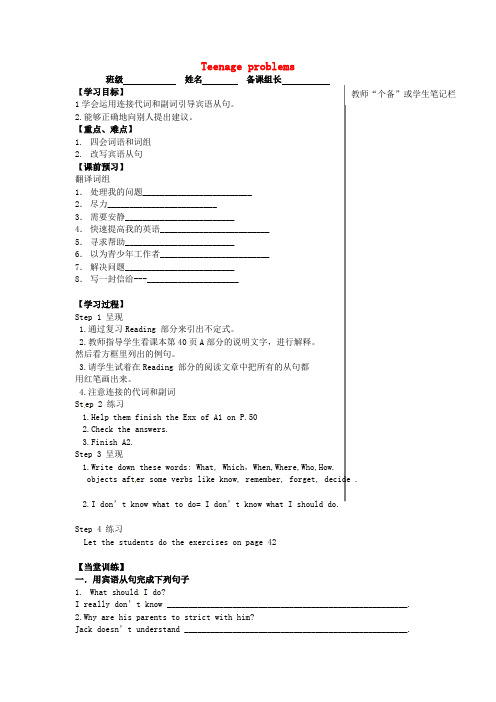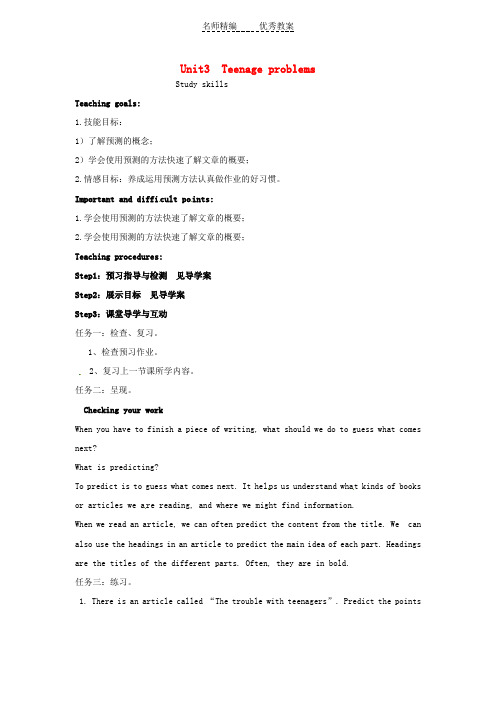牛津译林版九年级上册英语(新)学案:Unit3 Teenage problems Reading 2
牛津译林版九年级上册Unit 3《Teenage problems》(Grammar)导学案

Teenage problems班级姓名备课组长1学会运用连接代词和副词引导宾语从句。
2.能够正确地向别人提出建议。
【重点、难点】1.四会词语和词组2.改写宾语从句【课前预习】翻译词组1.处理我的问题_________________________2.尽力_________________________3.需要安静_________________________4.快速提高我的英语_________________________5.寻求帮助_________________________6.以为青少年工作者_________________________7.解决问题_________________________8.写一封信给---_____________________【学习过程】Step 1 呈现1.通过复习Reading 部分来引出不定式。
2.教师指导学生看课本第40页A部分的说明文字,进行解释。
然后看方框里列出的例句。
3.请学生试着在Reading 部分的阅读文章中把所有的从句都用红笔画出来。
4.注意连接的代词和副词St ep 2 练习1.Help them finish the Exx of A1 on P.502.Check the answers.3.Finish A2.Step 3 呈现1.Write down these words: What, Which,When,Where,Who,How.objects aft2.I don’t know what to do= I don’Step 4 练习Let the students do the exercises on page 42【当堂训练】一.用宾语从句完成下列句子1.What should I do?I really don’t know _______________________________________________________.2.Why are his parents to strict with him?Jack doesn’t understand ___________________________________________________.3.Whom should we ask for help?We wonder______________________________________________________________.4.Which club shall I join next term?I am not sure____________________________________________________________.5.When should he stop?Sometimes he forgets _____________________________________________________.6. How can she get to the museum?Kitty is wondering ___________________________________________________.二..用合适的连词完成句子1.He doesn’t know ______ to get there. I think he can take a bus.2.He doesn’t know _______ to buy a good camera. I think he can get one in Su Ning.3.She doesn’t know ______ to hand in the homework. I think she may do it tomorrow.4.There are different kinds of sports shoes. I can’t decide _______ to buy.5.He doesn’t know _______ to ask for help. I think he can call 110.6.He doesn’t know _______ to ask for help. I think he may talk to Sigmund Friend.7.The bus is full of people. I don’t know _____ to stand.8.Tom can’t find _______ to play with.9.I don’t feel hungry a t all. I don’t know ______to eat.10.People cut down many trees every year, the birds can’t find ______ to live.【课后提升】一.用所给词的正确形式填空1.She often has difficul ty expressing ______________(she).2.We felt strange about his ____________(silent) at the party as he used to bevery outgoing.3.Zhang Hua is a _________(care) girl. She often makes mistakes in her daily life.4.As a student, we should shar e our __________(worry) with our friends or ourteachers.5.You’d better go to bed _________(early) today than ___________(usually).6. I can’t eat it a lone. I would rather (take )it home ____(share) it with my little sister.7. Ask him to do what he can (help) us.8. Mr Sigmund Friend, a ____________(young) worker, can give you some good advice. 二.根据中文提示和句义写出单词1.Never keep your _________(担心) to yourself. It’s bad for your mind and body.2.After a long walk, his grandmother felt _________(疲劳).3.All the boys _________(解决) that Maths problem a moment ago.4.By________(谁) were X-ray machines invented many years ago?5.Mr Jiang is one of the _______________(严厉的) teachers in our school.6.There are al l kinds of __________(字典) on that shelf.7.I didn’t get my parents’ __________(答复) at all last Sunday.8.Have you tried that new ___________(方法) yet?9.His little sister doesn’t know how she can ________(提高) her English.10.At that time, we could hear the sound of _________(寂静) in the forest.三选择题( )1.What a nice paper plane! Can you show us ________ you make it?A. whetherB. howC. whyD. what( )2. Do you know _______i saw yes terday? It was my favorite star, Jackie!A. whomB. whenC. whereD. how( )3. –Could you tell me how long_______?—For two weeks.A. have you borrowed this bookB. you have borrowed this bookC. you have kept this bookD. have you kept this book( )4.—I feel stressed from time to time. Could you give me some advice?--_______ sharing your worries with your parents?A. Why don’t youB. How aboutC. Why notD. Would you like( )5. –Do you know _______ the girl in blue is ? –Maybe a doc tor.A. whoseB. howC. whatD. which( )6. He always gives me useful advice when I don’t know_______.A. who to talkB. who to talk toC. who will I talk toD. who should I talk to四.翻译句子1. 我的父母总是很忙。
牛津译林版-英语-九上-9A 3单元 Teenage problems

9A Unit 3 Teenage problems(2)第三单元青少年问题重点难点21.I hope I cam offer you some useful suggestions.我希望我能够提供一些有用的建议给你。
▲offer 用作动词,意为“提供;”“为…提供机会,给予”常用短语“offer sb. sth 或offer sth. For sb.”意思是“为某人提供某物”。
如:①I offered him a glass of wine.我敬了他一杯酒。
①will you offer the guests some coffee?请你给客人拿一些咖啡好吗?②I﹐ve been offered a job in Japan.日本有份工作要聘请我去做。
③The company has offered a high salary.公司提出高薪招聘。
④She offered a reward for the return of her lost bracelet.她为寻回遗失的手镯提出以报酬答谢。
⑤He offered §3,000 for the house.他提出了3000英镑买这间房子。
⑥We offered him the house for $ 20,000.我们要他出20,0000美元买这间房子。
offer to do sth.的意思是“主动提出做某事。
”如:She offered to carry the box for her mother. 她主动提出要帮她母亲拿箱子。
We offered to leave. 我们表示要走了。
He offered to lend me his bike.他表示要把自行车借给我。
Never to teach fish to swim.莫班门弄斧。
He offered to hit me. 他企图打我。
She offered to help me to learn English.她提出要帮助我学习英语。
Unit 3 Teenage problems辅导讲义(含答案)2024年牛津译林版英语九年级上册

B:Forget it.没关系。
3.表示不想提及或无关紧要,意为:忘了它吧;别提了;别放在心上。如:
A:What‘s he got to do with it?这跟他有什么关系?
B:All right,forget it.好吧,别提了。
例:The old woman looked very worried.
例题训练:
—What are you_______?
—My husband’s health problem_____me a lot.
A. worrying; worries B. worried; worries
C. worried about; worries about D. worrying about; worries
答:C、D
知识点8:give up(P46)放弃
用法解析:give构成的短语还有:
give away赠送give back还给give in屈服,让步,投降
give off发出(蒸汽、光等)give out用完,耗尽;散发,分发
例题训练:
他别无选择只能放弃自己的爱好。_________________________________________
We worked on pronunciation, stress and intonation.我们学习了语音、重读和语调。
She stressed that she wasn't going to help.她强调说她不会帮忙的。
stress作名词时,意为“压力;紧张;重读”;作动词时,意为“强调;使紧张;加压力于;用重音读”。
牛津译林版九年级上册Unit 3《Teenage problems》(Study skills)教案

Unit3 Teenage problemsStudy skillsTeaching goals:1.技能目标:1)了解预测的概念;2)学会使用预测的方法快速了解文章的概要;2.情感目标:养成运用预测方法认真做作业的好习惯。
Important and diffi cult po ints:1.学会使用预测的方法快速了解文章的概要;2.学会使用预测的方法快速了解文章的概要;Teaching procedures:Step1:预习指导与检测见导学案Step2:展示目标见导学案Step3:课堂导学与互动任务一:检查、复习。
1、检查预习作业。
2、复习上一节课所学内容。
任务二:呈现。
Checking your workWhen you have to finish a piece of writing, what should we do to guess what comes next?What is predicting?To predict is to guess what comes next. It hel ps us understand what kinds of books or articles we a re reading, and where we might find information.When we read an article, we can often predict the content from the title. We can also use the headings in an article to predict the main idea of each part. Headings are the titles of the different parts. Often, they are in bold.任务三:练习。
1. There is an article called “The trouble with teenagers”. Predict the pointsthat will be talked about in the article and tick (√) the correct boxes (Part A on page 45).Check the answers.Say:To get a general idea of a book or an article, we should ask some basic questions. If we predict the answers that the questions might have, it will help us find th e answers more quickly and easily when we read in detail.2. Millie is reading an art icle in Teenage magazine. Match her questions with your predicted answers. Write the correct letter in each blan k (Part B on page 45) .2、两人一组讨论。
牛津译林版英语九上9aunit3teenageproblems---reading

Task6:Summary
Millie She_____________________forherhob hardlyhassparetime Problems bies. staysup do/finish Sheoften________lateto________herex ercises. Causes Butsheacceptsitbecauseshethinksit’sim (原因) portantto_______herhomeworkontime finish . dealwith Shedoesn’tknowhowto________it. bad/stressed/worried Feelings Shefeelsquite____________________a boutit.
TheletterwrittenbySigmund DearMillie: Thankyouverymuchforyourletter.IhopeIcanhelpyou . stayedup Yousaidyouyouoften________latetofinishallyourho mework.Planyourdaycarefully.Makealistofallthe_ homework _________youhave.Thenworkouthowmuchtimey ouneedtofinishitall.Thiswillgiveyouanideaofhowm spare uch_________timeyouhave. Youalsosaidthatyoudonothaveenoughtimeforyour_ _______.Whataboutchoosingyourhobbyaccording hobbies tothetimeyourhave?Forexample,play_________if youhavealotoftime,andlistentomusicifyouonlyash volleyball orttime.Ihopeyouthinkthatmyadviceis______taki ng. worth Bestwishes SigmundFriend
牛津译林版九年级英语上册Unit3《Teenageproblems.》Lesson2说课稿

牛津译林版九年级英语上册 Unit 3 《Teenage problems.》Lesson 2说课稿一. 教材分析《牛津译林版九年级英语上册 Unit 3 》Lesson 2 是本单元的第二课,主要围绕着青少年的问题进行讨论。
本课的主要内容是通过一个关于青少年问题的对话,让学生掌握与青少年问题相关的词汇和表达方式,同时提高他们的听说能力和合作能力。
通过本课的学习,学生可以更好地了解青少年阶段可能会遇到的问题,并学会如何用英语进行表达和讨论。
二. 学情分析九年级的学生已经具备了一定的英语基础,能够理解和运用一些基本的英语词汇和句型。
但是,他们在口语表达和听力理解方面还存在一些困难。
此外,对于一些青少年问题,他们可能还没有深入的思考和了解。
因此,在教学过程中,需要注重培养学生的口语表达能力和听力理解能力,同时引导学生思考和讨论青少年问题。
三. 说教学目标1.知识目标:学生能够掌握与青少年问题相关的词汇和表达方式,如“identity crisis”、“pressure from parents” 等。
2.能力目标:学生能够通过听力和口语活动,提高他们的听说能力。
3.情感目标:学生能够了解青少年阶段可能会遇到的问题,并学会如何面对和解决这些问题。
四. 说教学重难点1.重点:学生能够掌握与青少年问题相关的词汇和表达方式。
2.难点:学生能够正确运用这些词汇和表达方式进行口语表达和听力理解。
五. 说教学方法与手段1.交际式教学法:通过模拟真实场景,让学生在实际语境中进行英语交际,提高他们的口语表达能力和听力理解能力。
2.任务型教学法:通过完成各种任务,引导学生主动参与学习过程,激发他们的学习兴趣和积极性。
3.多媒体教学手段:利用多媒体课件和音频材料,为学生提供丰富的学习资源和真实的语言环境。
六. 说教学过程1.导入:通过展示一些青少年问题的图片,引导学生思考和讨论青少年阶段可能会遇到的问题。
2.听力理解:让学生听一个关于青少年问题的对话,并回答相关问题,以提高他们的听力理解能力。
牛津译林初中九年级上册英语 Unit 3 Teenage problems Task课件 (2)
I hope you think my advice is worth taking.
Make a survey
Problems Ways to solve them
Then write a report according to the information you get.
Complete the sentences: 1.如果有人嘲笑你,对他不予理睬。
If someone ___la_u_g_h_s_a_t__ you, _p_a_y__n_o_a_t_t_en_t_io_n__t_o him. 2. 不要把压力放在心里,否则问题会变得更糟。 Don’t ___________________, or the the problkeemepwislltr_e_s_s_t_o_y_o_u_r_se_l_f.
What is his problem? Can you give him some suggestions?
What is his problem? Can you give him some suggestions?
What is his problem? Can you give him some suggestions?
Ask and answer: How does Millie feel the next day? Why? Does Millie refuse to do so much work? What is she looking forward to ? How does Simon like football? What is Simon’s dream? How long does Simon often play football? What does Simon think of his hobbies? What do you think of Simon’s parents?
九年级英语上册Unit3Teenageproblems复习学案新牛津版
九年级英语上册Unit3Teenageproblems复习学案新⽜津版Unit3学习⽬标1、掌握本单元单词、词组;2、掌握由特殊疑问词引导的宾语从句(注意事态呼应和语序);3、复习运⽤给出建议Why not...?、What/How about…?、Let’s…Shall we…?学习重难点同上。
教学补记学习⽅法Task-based teaching method活动⼀:1、⾃主先学(⾃学指导):(a. 录⾳跟读; b. ⾃⾏记忆10分钟)⼀、默写下列单词:(5分钟)分数_________ 2.发疯的;⽣⽓的 ___________ 3.测试 _______4. 或许_______5. 想象_________6.除…之外(conj.)_______7.处理 _____ 8.怀疑 __________ 9.值得;值…钱_______10.原因 ______ 11.严格的、严厉的____ 12.课业________13.友谊 ________ 14.清单______ 15.谁(宾格) _____16.担⼼;令⼈担⼼的事__________17.⽅法_________18.解决_________19.字典_________ 20.答复________ 21.化学_____ 22.进展_________23.⼤声地,出声地__________24.提及;说起_______25.发⾳(n.)_________26.choose ________ (n.) 27.wake ______(adj.) 28.hard ________(⼏乎不)29. 宝贵的______________ 30. silence __________(adj.)⼆、默写下列短语:(5’)1.使⼈受不了2.处理 ________________3.熬夜 __________4.值得做 _______________5.对某⼈严格要求6.呆在户外7.算出,解决 8.根据 ____________________9.取得进步 10.嘲笑 ________________11.复习;回顾 12.不客⽓ _______________13.与……同龄 14.少吃饭多运动 _______15.除了做某事别⽆选择 16.接到某⼈来信17.我对⾜球的热爱 18.陷⼊困境_________________19.太在乎 ___________ 20. 保持清醒______________________活动⼆⼀、连接代词和连接副词引导的宾语从句(5’, 见课本40-41页具体例句)常见的连接词:what, who, whom, whose, which;连接副词:when, where,how, why.1、连接代词和连接副词有词义,并且在从句中充当句⼦成分。
牛津译林版英语九年级上册英语课件:9A Unit3 Teenage problems Reading (共24张PPT)
Millie
Problems Friendship Lots of homework Low marks Not enough time for hobbies Staying up late Strict parents Weight
× _____ √ _____ × _____ √ _____ √ _____ × _____ × _____
× ______ × ______ × ______ ______ √ × ______ √ ______ × ______
while-reading
Name
Millie
9
Simon
9
Grade Hobbies
Spare time Feelings Cause
hardly any spare time tired; stressed…
Millie
Simon
Kitty
Daniel
Amy
Sandy
Pair work:
A:What problem do you have?
B:…
A:What should I do?
B: Perhaps…
pre-reading
imagine
a life with so much homework up late
8. valuable ___ d h. form a picture in your mind of
someone or sth.
while-reading
What are Millie and Simon’s problems?
while-reading
Part B2 Millie and Simon’s problems (√, ×)
牛津译林版九年级上册英语 Unit 3 Teenage problems单词用法汇总学案设计
Unit 3 Teenage problems一、单词辨析1.drive me mad 使某人发疯mad的含义为:adj疯狂的,愚蠢的,狂欢的,非常激动的,狂热的,着迷的其结构是drive+宾语+形容词作宾语补足语。
【注意】① drive sb.mad有时候也可以说成drive sb.crazy②请注意总结与drive sb mad类似结构的词组: make sb. angry使某人愤怒; set sb.free释放某人;③mad的含义为:adj疯狂的,愚蠢的,狂欢的,非常激动的,狂热的,着迷的;其比较等级的形式madder; maddest;④注意学习词组: like mad【非正式用语】疯狂地;迅疾地练习:(1) What's up?I can't stand the noise outside. It's nearly _______ me mad.A keeping B. turning C causing D driving(2)Do you have any idea what has ________ him mad?A. madeB. drivenC. forced D kept(3)每次我邻居半夜高歌时我都快崩溃了It really _____________________________________when my neighbor sings in the night.解析:DB drives me mad2.deal with 处理,对付deal的过去式: dealtdeal with以及do with的含义及用法:【注意】deal with与do with这两个短语均有“处理”、“对待”之意。
但它们的用法有所不同。
①当处理、对待的对象是具体的物时,用do with;当处理对象是比较困难的、抽象的事情、局势等时,用deal with。
如:What did you do with my umbrella'?你把我的伞放在哪儿了?How shall we deal with this matter?这件事情我们怎样处理?②当处理、应付的对象是“人”时,二者都可以用,只是意思稍微不同;当宾语是表“人”的反身代词时,只用do with。
- 1、下载文档前请自行甄别文档内容的完整性,平台不提供额外的编辑、内容补充、找答案等附加服务。
- 2、"仅部分预览"的文档,不可在线预览部分如存在完整性等问题,可反馈申请退款(可完整预览的文档不适用该条件!)。
- 3、如文档侵犯您的权益,请联系客服反馈,我们会尽快为您处理(人工客服工作时间:9:00-18:30)。
9上Unit3 Teenage problemsPeriod 3 Reading2班级:姓名:得分:【学习目标】:1、学会表达自己的烦恼和情感,学会向别人寻求2、学习并掌握“四会”词汇,了解书信的格式3、思考个人问题及其解决问题的方法【自主学习】:一、翻译下列短语;1、be crazy about 9.the cause of2、get into trouble 10、feel angry3、be strict with sb 11、help sb relaxed4、be strict in sth 12、严厉的父母亲5、stay out late 13、比平时上床迟6、stay up late 14、精心计划你的每一天7、make one’s life more interesting 15、根据……8、achieve a blanace between …and…16.提供一些有用的建议17.The cause of 18.一两个小时19.allow sb to do sth 20.对某人来说宝贵二、翻译下列句子:1然而我对足球的热爱已经成为我的一个问题的原因However, my love of football my problem.2.然后我陷入了麻烦,因为我的父母不允许我下午六点以后在外面玩。
Then I because my parents do notoutside after 6p.m..3、我几乎没有空闲时间顾及我的业余爱好。
I have any my hobbies .4、我不明白他们为什么对我如此严格。
I do not understand why they .5、我想知道我怎么能够在我的学业和爱好之间获得平衡。
I wonder how I can my schoolwork myhobbies【合作交流】:然后我陷入了麻烦,因为我的父母不允许我下午六点以后在外面玩。
Then I get into trouble because my parents do not allow me to stay out outside after6p.m..注:get into trouble陷入了麻烦(困境),trouble为不可数名词,have (some) trouble in doing sth 在做某事方面有(些)困难;allow sb to do sth允许某人做某事→被动be allowed to do sth 被允许做某事,如:18岁以下的孩子不允许进入网吧。
Children under 18 the Internet bars【点拨拓展】:cause 与reason区别cause强调使其某事发生;reason侧重解释做某事的原因。
这场火灾的原因还不为人知。
the fire is unknown.【达标检测】:一、词汇Ⅰ. 用所给词的适当形式填空。
A)1. I don’t know how________(solve)the problem.2. The young should be allowed ________ (achieve) their dreams.3. Thanks to your ________ (suggest), I got to complete the job in time.4. Wang Fei is one of_______ _ (popular)singers this year.5. My hobby is________ (play) football. Sometimes I get homelate because I forget the time.B)1.It _________ (be) five years since I _________ (meet) you last.2.Can I do anything _________ (help), mum?3.--- Where is Jim? He _______(want) on the phone. --- He _________(write) a letter in the room.4.He preferred __________ (swim) to _________ (skate).5.Why ____________ (not play) basketball instead of _________ (swim)?6. When I see the sun, I have the feeling of_______ (warm).7. If you feel_______ (stress), try to be_______ (relax).8. Although he is thin, he is a man of great_______ (strong).10.Smoking is not_______(允许)in the office.11. The city_______(遭受损失)serious damage from the earthquake.12. I am pleased that he gladly_______(接受)our invitation.13. After talking to his parents, he became even_______(难过)about the problem.14. You shouldn't leave a child_______(单独)in the house.Ⅱ. 单项选择1.You are not good at English ,but you can’t .A. give it inB. give in itC. give it upD. give upit2.I can’t decide .A. what to do itB. how shall I do itC. how to do itD.what shall I do it3.You must focus your studies.A. inB. onC. atD. with4. He did much work that he felt tired .A. soB. suchC. someD. any5.Most Americans would prefer to keep their problems_______ themselves and solvetheir problems_______ themselves.A. to; byB. by; toC. for; toD. in; on6. _______ good suggestion ! I haven't heard of_______ wonderful advice for a long time.A. What a; such aB. How; suchC. What a; suchD. How; such7. - Allen, so many books are on your bedroom floor.- Sorry, Mum. I'll_______ my books at once.A. put onB. put awayC. put outD. put up8. He was made _________ outside in the sun.A. standB. to standC. stoodD.standing9. The you are , the mistakes you will make.A. careful; littleB. more careful, lessC. more careful; few .D.more careful, fewer10.“Advice”means a .A. helping suggestB. helpful suggestC. helpful suggestionD. helpful suggesting11. If you don’t go to the cinema tonight, _____ .A. so will IB. Neither do IC. Nor shall ID. So I will12. _____ of the twins has been there before.A. BothB. NeitherC. allD. None13. The colours of his trousers are different from _____ of yours.A. oneB. onesC. thatD. those14. “What do you think of his surfing?” “Oh, no one does _____ .”A. goodB. wellC. betterD. best15. Can you please spend _____ explaining it _____ us?A. sometimes; toB. some time; toC. some times; forD. sometime; for 课后拓展一、阅读理解Mr. Swales wanted to find out what his students' parents did. He had just called Jodie when some girls burst out laughing. Shirley shouted, "Jodie's Daddy is a Garbageman(垃圾清理工)!"Everybody in the class laughed out loud, except Jodie. She felt her face turn red."Silence!" Mr. Swales said, "Being a garbagemen is a difficult and useful job. We should all be grateful to Jodie's father."Jodie's father came to walk her home from school as usual, but she didn't run up to him the way she always did. When they got back home, Jodie went to her room and cried for a long time.Her father came into her room, "What happened, Jodie? Why are you so sad?"Jodie told her father what had happened and looked at him. He didn't seem angry or hurt. "Well," he said, "they are right. Being a garbageman is a dirty job. Tomorrow's Saturday. Come to work with me, Jodie."The place really smell too good. Jodie wrinkled her nose. "Don't worry, kid. In five minutes you won't smell a thing." said her father.Everybody there was working hard, and they seemed to have a good time. Jodie's father handed her a pair of gloves(手套) and told her to get the little plastic bags and throw them into the truck.It was fun, but also hard work. Jodie's arms soon got tired. At last, no more garbage was left and Jodie felt very happy."Garbage is disgusting(令人厌的), but when we clear it away, everything's nice and clean. You can make yourself happy only by making others happy. That's why I like being a garbageman so much."Jodie gave her dirty, smelly garbageman daddy a big kiss, She said, "When I grow up, I will be a garbagegirl!"Now whenever someone asks Jodie what her daddy does, she says, "He's a garbageman! Everybody makes garbage, but my daddy takes it away!"1. What happened in My Swale's class?A. He wanted to show what job was the most useful.B. He asked an improper question.C. Jodie gave an honest answer.D. Jodie was laughed at for his father's job.2. Why did Jodie's father take her to his workplace?A. To make Jodie calm down.B. To show how dirty his job was.C. To help Jodie learn about his job.D. To keep Jodie away from her classmates.3. Jodie gave her father a big kiss mainly because_______.A. he was practicalB. he was unselfishC. he was cheerfulD. he was hard-working4. How does Jodie feel about her father now?A. SadB. CuriousC. ShyD. Proud二、缺词填空‘Early to bed, early to rise, makes a man healthy, wealthy and wise.’This is an old English saying. Have you h 1 of it before? It means that we must go to bed early and g 2 up early in the morning. Then we shall stay h 3 . We shall also be wealthy and clever wise.This is true. The body must have e 4 sleep to be healthy. Children of young age should have ten hours’ sleep every n 5 . Children who do not have enough sleep cannot do their work very well. They will not be wise and they may not become wealthy!The body also needs e 6 . Walking, running, jumping, swimming and playing games are all exercise. Exercise keeps the body s 7 .Exercise also helps the blood to m 8 around inside the body. This is very important. Our blood takes food to all p 9 of our body. The head also needs blood. Exercise helps us to think b 10 .1.__________2.__________3.__________4._________5.__________6._________7._________8._________9.__________ 10.__________。
